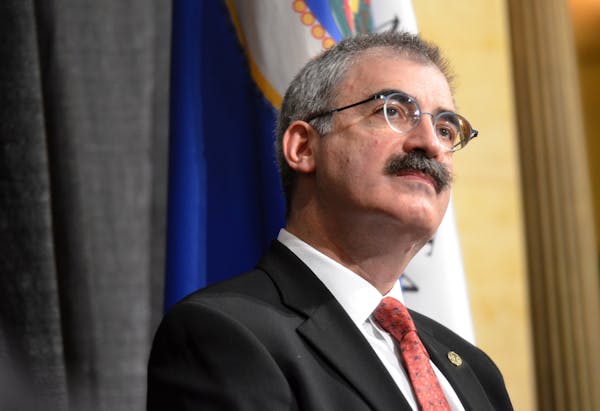Steven Rosenstone insists he's trying not to take it personally.
In the past two weeks, faculty groups at five Minnesota state universities have passed votes of no confidence against him.
Two on the same day.
But as chancellor of Minnesota's largest public college system, Rosenstone says this really isn't about him at all. If the faculty members are up in arms, he says, it's only because he's pushing them beyond their comfort zone. "Change is hard," he says.
For the past year, tensions have been simmering over Rosenstone's signature initiative, a plan called Charting the Future, which aims to streamline and transform the 31 schools in the Minnesota State Colleges and Universities (MnSCU) system.
Officially, it's a work-in-progress with lofty goals such as "ensuring access to an extraordinary education." But Rosenstone, 62, readily admits that he wants to shake things up, and find less expensive, more innovative ways to educate the 400,000 students who walk through their doors.
"We're asking some very big questions here, about how we can do a better job serving students," he said.
But critics say that his brusque manner and a penchant for secrecy have alienated faculty and students alike, and that Rosenstone has run roughshod over concerns that some changes could harm the quality of education.
On Oct. 23, two faculty unions — representing nearly 9,000 professors and instructors — announced they'll no longer take part in the Charting the Future project because they've lost trust in Rosenstone. Last week, in fact, when the chancellor publicly offered to bring in a state mediator, both unions blasted the move as a public relations ploy.
"This has come down to being a Greek tragedy," said Monte Bute, an outspoken sociology professor at Metro State University. "Rosenstone's attitude is 'my way or the highway.' Well, you can see we're hitting the highway."
'Transformational leader'
Three years ago, when Rosenstone was hired, MnSCU was looking for someone to light a fire under the sprawling, tradition-bound system to help it adapt to changing times and tighter budgets, said Thomas Renier, now the board chair. "I heard over and over, we need a transformational leader," he said. "And we got one."
Rosenstone was a vice president at the University of Minnesota who'd spent his career in the humanities, first as a political science professor and later as dean of the college of liberal arts.
At the time, he admitted that he knew little about the technical and vocational schools that make up a large chunk of the MnSCU system. But in his first months on the job, he hit the road, visiting dozens of campuses.
By the fall of 2012, he launched what became "Charting the Future" to set a new course. He assigned three work groups of faculty, students and administrators to come up with a plan: to curb costs, use more online technology and help students graduate on time with less debt.
But when the first draft surfaced last year, faculty leaders cried foul. The Inter Faculty Organization, which represents the seven state universities, issued a scathing denouncement, calling it a recipe for "Soviet-style centralized control." The union argued that the plan, which called for more cooperation among the scattered campuses, gave too much deference to the "demands of the business community" and threatened the academic freedom that the schools had always enjoyed.
Since then, their suspicions have only deepened.
In July, word leaked that Rosenstone had quietly hired a consulting firm, McKinsey & Co., to help guide the planning for Charting the Future at a cost of $2 million. When faculty leaders asked for a copy of the company's bid proposal, almost all the pages were blacked out.
The news was especially alarming, according to Rosenstone's critics, because the same company had published a 2010 report, "Winning by Degrees," touting ways to "increase productivity" by replacing full-time faculty with temporary instructors and using centrally designed courses.
Bute called it a "pre-canned script," adding "we just felt like this was being rammed down our throats."
Rosenstone says that's untrue, and that McKinsey was hired only to help start the planning process. The final plan, he said, will be designed entirely by teams of faculty, staff, students and administrators.
Debate 'nonexistent'
Jim Grabowska, president of the Inter Faculty Organization, said that faculty members have tried to voice dissenting views in planning meetings, but that they're routinely dismissed.
"The culture of MnSCU, historically, has been one of shared governance, meaning that you put out an idea and you seek input," he said. "When Steven Rosenstone became chancellor, that changed." When Rosenstone makes up his mind, he added, "the ability to bend, fold, spindle or mutilate the idea is nonexistent."
Rosenstone, though, says he welcomes everyone's ideas. "From the very beginning, we designed a very open process," he said. "If I were so cocky, so controlling … I wouldn't have set it up this way."
This month, he notes, staffers are fanning out to dozens of campuses with a Charting the Future poster show, to get feedback from students and employees.
Renier, the board chairman, says he doesn't blame Rosenstone for the rift with faculty. "Steven has done everything possible to hear the concerns of the faculty and of the students," he said. "We're hoping that the faculty comes back to the table, because we really need their help here."
Grabowska, the union president, says the ball is in Rosenstone's court.
"It seemed to us that he was continually ignoring our concerns. We were not getting through," he said.
"To paraphrase the Verizon commercial: Can you hear us now?"
Maura Lerner • 612-673-7384

This St. Paul native now goes by Kandi Krush, and she body-slams her opponents in the ring

Baseball Metro Player of the Year packs up his five tools and leaves

Prep baseball 2024: 35 Minnesota stars who the recruiters covet
Police searching for St. Paul home intruder who raped, robbed woman

